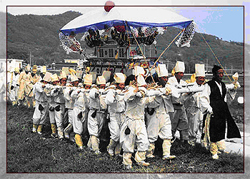
Vocal Music I
Sijo
"Composed in three-line brevity but sustained in melodiously drawn-out notes in recitation is the sijo ('fleeting ode')."[11]Chan E. Park, Voices from the Straw Mat, 34. Exuding a truth captured in a momentary awakening and improvisational in nature, sijo was a poetic-musical commentary on life and reflection of the aesthetic sensibilities of upper class Koreans who had access to education and time for contemplation. Composed and delivered orally, sijo was a powerfully direct delivery of a political message or stance. In the transition between the fall of Koryô and the rise of Chosôn, Yi Pangwôn, third son of T´aejo the founder and the third king of the new dynasty invited Chông Mongju, respected minister loyal to Koryô, to persuade him to join the forces of the new dynasty:
|
Lyrics
|
|
"This way, that way, what difference?
Entangled are the arrowroots deep in the Mansu mountain, so be it. Let us be so tangled for ages to come." "Were I to die and die, a hundred more times die,
|
|
Translation by Sijo
|
Sijo was an equally potent confessor of love. A Chosôn kisaeng, Hwang Chini, lived a highly controversial and carefree life including multiple love affairs with famed scholars, poets, and even a Buddhist Zen master:
|
Lyrics
|
|
My love is a blue mountain, yours a green rapid.
Water flows, but would mountain change? Perhaps water misses mountain, see? It coils around the mountain. |
|
Translation by Hwang Chini
|
Sijo is also an existentialist philosopher convincing you to bypass worldly fame and recognition. Consider Hyôngsane, "Like the natural jade at Mt. Hyoung," by Moon Hyun.[12]Moon Hyun's Shijo: Like the Natural Jade at Mt. Hyoung. Polyphony Classics, 1999.
Hyôngsane
|
Hyôngsane Hyôngsane pagogul ôdô, sesangsaram poeryôttôni Kôtchi torioni sogûl alli nui-itssûri Tuôra alli alchini torindûsi (itkora) |
Like the natural jade at Mr. Hyoung I acquired a modest piece of jade from Hyôngsan, and showed it to people It's just a rock on the surface, so no one knows what's inside Let it be. Those who know will know, so stay like a rock. |
| Translation by Moon Hyun. | |
Work Songs
In tribal society, sowing, first fruits, harvests, and other such rites involve the participation of the whole community in which work and play are intricately entwined.[13]Victor Turner, Process, Performance, and Pilgrimage. New Delhi: Concept Publishing Company, 1979: 25. In pre-industrial Korea, songs accompanied specific types of labor, since "the idea of working in the fields in groups without singing would have been unthinkable."[14]Han Manyoung, 'Folk Songs of Korean Rural Life and Their Characteristics Based on the Rice Farming Songs.' Journal of the Society for Asian Music 9 (1978): 21-28; 21. Before machinery replaced human labor, numerous songs accompanied otherwise monotonous and strenuous jobs, and people at work transcended pain and boredom by tuning in to one another´s rhythms.

Sangyô-sori
In Korea, work songs may be classified into several categories according to their functions: farming, weaving, transporting, fishing, milling, sewing, and washing, among others. Each region has its own stylistic and lyrical variations. Look at the photo of the sangyô-sori (funeral bier song) of Yongin county. The villagers are carrying the bier decorated with flowers and other auspicious items for the journey of the dead, and the man in black vest is the lead singer. The family members of the deceased follow behind dressed in unbleached hemp. In the matters related to birth, marriage, and death, Koreans have not completely lost their traditional ways. The music and the kinetic function are interwoven in the song: the tempo slows when the procession passes flat plains, and quickens uphill. Since Korean burial grounds are always on a hill, the rhythm finds natural points of shift in the song.
Composer: 0
-
"Cry of Bier Bearer"
|
|
|
|
Ohô, ohôha, ôgôrinômch'anôhwa
Nônô nôha, ôgôri nômch'anôôho. |
Last night in my dream, my feeble body, My diseased body, oh my dear mother. Give me a bowl of cold water! Of all the family and relatives, Of all the siblings and friends, who´d go in my place? What good is nogyông[15]Deer antler, used in herbal medicine to increase the medicinal effect., what good is medicine? What use is a shaman? What use is a fortune teller? Last night in my dream, the messenger from the world of dead was swooping on me, a hammer in one hand, a chain in the other.[16]Photo and lyric from http://4444.st/sangyee-14.htm, translated by Chan E. Park
|
| Translation by Chan E.Park. | |





Korean traditional music can be divided into Korean folk music, aristocratic chamber music, Korean court music, and religious music.




